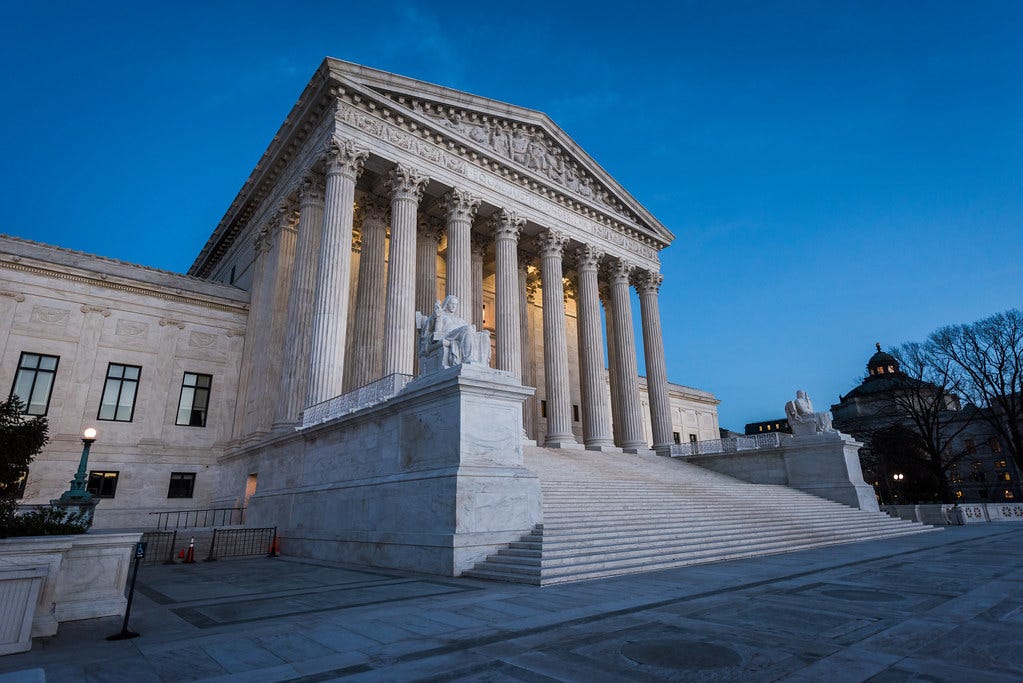With No AI Regulation in Sight, Industry Bodies Are Acting
How associations are leading their sectors through the AI era.
Pennsylvania Avenue leads to Capitol Hill in Washington, DC. Photo by me (2023).
Companies and individuals hoping for federal AI regulation in the near future should table their interest for the short term. Federal regulation isn’t on the docket for 2024, and neither presidential campaign is focusing on AI regulation as a significant platform issue for the first 100 days of their would-be Administration in 2025. As a result, industry organizations will need to lead the way with a combination of advocacy and legal action.
Living in Washington, DC, you learn that election years are difficult to get any kind of significant legislation passed. Both parties are in significant policy battles in their efforts to sway voters. Election years also serve as a crystal ball for legislation in the ensuing year as the winning presidential candidate rushes to pass laws to fulfill their campaign promises. With both parties playing down heavy regulation and promoting AI surgery. Those interested can see the parties' views on AI here and here.
Europe and several states have already engaged in regulation, forcing some businesses with international interests to meet their requirements. However, given the open federal regulatory environment, desired individual, corporate, and industry safeguards do not exist.
Knowing that the federal government is unlikely to provide formal legislative regulation for the country, some individual industry bodies are already taking action. Seizing the mantle, associations and trade organizations advocate for their sector with regulators, legislators, and the court system.
Associations Engaging in Industry Actions
It’s only a matter of time before the Supreme Court weighs in on an association-led AI case. Photo taken by me (2017).
Industry and trade associations are natural leaders and can serve their members as sectors wrangle with how to embrace artificial intelligence. Historically, associations advocate for their members on important matters with Capitol Hill, the executive branch and its related regulatory bodies, the courts, state governments (in some cases), and the general public. The lack of federal AI protections and legislation has opened the door for a new series of actions.
Leading the way are industry advocates like the American Medical Association (AMA), American Health Information Management Association, the National Association of Manufacturers (NAM), the Recording Academy, and the Recording Industry Association of America (RIAA). These associations are proactively addressing AI regulation and ethical best practices on behalf of their members by:
Engaging in legal action against companies that use AI to violate intellectual property and other interests (RIAA)
Lobbying on best practices to regulate AI and to create legislation (AMA)
Generating guides on how companies can use AI for an ethical competitive advantage (NAM)
Publishing industry guidance for individual practitioners on how to use AI (AHIMA)
Deploying media relations and grassroots campaigns to sway the general public (Recording Academy)
Guiding industry members in education and best practices is a natural course of action for associations. They can strengthen their sector and help individual members defray training costs. Another association, the American National Advertisers (ANA), turned to CognitivePath to help educate their industry members on best practices. CognitivePath built ANA’s Marketing AI Use Case Compendium and ran a use case prioritization workshop at the association's AI conference last Spring.
Given the need for accountability and a general lack of concern for some industry’s general interests, trade associations will need to for the RIAA’s lead, and take legal action against offending parties. In addition to RIAA’s actions against music AI company Sumo, several lawsuits have been waged against OpenAI for wrongful use of intellectual property as training data, including the Center for Investigative Reporting and the Authors Guild.
Legal actions and the resulting precedence created may be the fastest and easiest way for industry organizations to establish AI protections. The court system will be forced to clearly define legal interpretations on accountability for wayward AI providers and bad actors who use AI tools for wrongdoing.
Conclusion
Even though we are two years into the generative AI boom, lawmakers have yet to offer clear guidance and regulations on how to implement and use AI ethically. Based on current campaign platforms, it is clear the government will not proactively take the lead in regulating AI uses anytime soon. As a result, companies and individual professionals are turning to their industry bodies to protect and guide them.
As the AI boom sparked by ChatGPT’s launch two years ago continues to progress and mature, more industry bodies will be called upon to lead and protect their members. Industry leaders have a great opportunity to help forge a vision for their sectors and lead them through the AI adoption era.








